- Home
- Chris Ryan
Battleground
Battleground Read online
Table of Contents
Cover
Copyright
Fact
Also by Chris Ryan
Author’ Note
Location: Afghanistan
Afghanistan Fact Sheet
Battleground
Prologue
Chapter One
Chapter Two
Chapter Three
Chapter Four
Chapter Five
Chapter Six
Chapter Seven
Chapter Eight
Chapter Nine
Chapter Ten
Chapter Eleven
Chapter Twelve
Chapter Thirteen
Chapter Fourteen
Chapter Fifteen
Chapter Sixteen
Chapter Seventeen
Chapter Eighteen
Chapter Nineteen
Chapter Twenty
Chapter Twenty-one
Chapter Twenty-two
Chapter Twenty-three
Chapter Twenty-four
Chapter Twenty-five
Chapter Twenty-six
Epilogue
Battleground Glossary
Other books by this author
This eBook is copyright material and must not be copied, reproduced, transferred, distributed, leased, licensed or publicly performed or used in any way except as specifically permitted in writing by the publishers, as allowed under the terms and conditions under which it was purchased or as strictly permitted by applicable copyright law. Any unauthorised distribution or use of this text may be a direct infringement of the author’s and publisher’s rights and those responsible may be liable in law accordingly.
Version 1.0
Epub ISBN 9781407050782
www.randomhouse.co.uk
BATTLEGROUND
A DOUBLEDAY BOOK
Hardback: 978 0 385 61299 9
Trade paperback: 978 0 385 61300 2
Published in Great Britain by doubleday, an imprint of Random House Children’s Books
A Random House Group Company
This edition published 2009
1 3 5 7 9 10 8 6 4 2
Copyright © Chris ryan, 2009
The right of Chris Ryan to be identified as The author of this work has been asserted in accordance with The Copyright, Designs and Patents Act 1998.
Battleground is a work of fiction. Any resemblance of characters to persons living or dead is purely coincidental.
All rights reserved. No part of this publication may be reproduced, stored in a retrieval system, or transmitted in any form or by any means, electronic, mechanical, photocopying, recording or otherwise, without The prior permission of The publishers.
The Random House Group Limited supports the Forest Stewardship Council (FSC), The leading international forest certification organization. All our titles that are printed on Greenpeace-approved FSC-certified paper carry The FSC logo. Our paper procurement policy can be found at www.rbooks.co.uk/environment.
Set in Garamond
RANDOM HOUSE CHILDREN’S BOOKS
61-63 Uxbridge Road, Lndon W55SA
www.kidsatrandomhouse.co.uk
www.rbooks.co.uk
Addresses for companies within The Random House Group Limited can be found at:
www.randomhouse.co.uk/offices.htm
The RANDOM HOUSE GROUP Limited Reg. No. 954009
A CIP catalogue record for this book is available from The British Library.
Printed and bound in Great Britain by Clays Ltd, St Ives plc
FACT
On 7 September 1997, former Soviet military commander Alexander Lebev claimed that 100 Russian-made suitcase- sized nuclear bombs were currently ‘not under Russian control’. The Russian Federation denied these claims, but they were backed up by stanislav Lunev, The highest-ranking Soviet officer ever to defect from Russia. Lunev believed that some of these nuclear weapons had already been deployed. What was beyond doubt was that The Russians no longer knew where they were . . .
www.chrisryanadventures.co.uk
Also by Chris Ryan, and published by
Random House Children’s Books:
The Code Red Adventures
FLASH FLOOD
WILDFIRE
OUTBREAK
VORTEX
TWISTER
The Alpha Force Series
SURVIVAL
RAT-CATCHER
DESERT PURSUIT
HOSTAGE
RED CENTRE
HUNTED
BLOOD MONEY
FAULT LINE
BLACK GOLD
UNTOUCHABLE
Published by the Random House Group
for adult readers:
Non-fiction
The One That Got Away
Chris Ryan’s SAS Fitness Book
Chris Ryan’s Ultimate Survival Guide
Fiction
Stand By, Stand By
Zero Option
The Kremlin Device
Tenth Man Down
The Hit List
The Watchman
Land of Fire
Greed
The Increment
Blackout
Ultimate Weapon
Strike Back
Firefight
Who Dares Wins
One Good Turn
Adult Quick Read for World Book Day 2008
Author’s note
In August 2008, 3,000 British troops and a convoy of vehicles spent five days moving a new turbine across Helmand Province to the Kajaki dam. It was one of the biggest operations of the current war effort in Afghanistan and is testament to the importance of Kajaki. British forces continue to guard the dam diligently. It remains a principal target for the enemy insurgents in the area, who would like to see it destroyed. If this happened, it would be an untold disaster for southern Afghanistan.
BATTLEGROUND
Chris RyanSAS HERODOUBLEDAY
Prologue
The mountains of Afghanistan, 1986.
‘Ambush!’
Dmitri Kirov, the Soviet soldier, barked the word in Russian. He was in the middle of the convoy, which came to a sudden halt. There were ten of them in three vehicles, all heavily armed because they carried a precious cargo: the case at his feet in the rear of this open-backed truck.
They’d been going slowly. The road up into the mountains was narrow. The pale, wintry sun failed to melt the patches of ice on the road, and with the wind it felt like it was several degrees below zero. Worse than that, their own army had littered this place with anti-personnel mines as part of their long war against the Mujahideen of Afghanistan. These mines were an effective way of killing people. The trouble with them was that they didn’t mind which people they killed: Mujahideen, innocent children, or Soviet soldiers.
To drive through this part of the world was to take your life in your hands.
‘Ambush!’
Kirov was a tough man. A fierce soldier. They all were. That’s why they’d been chosen for this job – a job where they could expect random attacks from a determined enemy. But even he knew, as he stood exposed in the open air with his AK-47 pointing straight ahead, that the situation was bad. To his right, on the slope leading up into the mountains, three men in black robes and head-dresses had appeared from nowhere. They each knelt on one knee and pointed their rifles in the direction of the convoy. Four more men appeared, two at the front of the convoy and two at the back, at a distance of about twenty metres. They were dressed the same way, but instead of rifles they carried rocket-propelled grenade launchers. RPG-7s. Dmitri Kirov would recognize them anywhere.
There was a still, horrible silence, then one of the men at the front barked an order.
The thumping sound of the grenades being launched went right thro
ugh Kirov. But it was nothing compared to the sound they made when they hit the front and rear trucks in the convoy. It was a massive explosion that echoed across the mountains. The truck ahead of him was a sudden flash of orange fire and black smoke. He thought he heard the sound of one of his comrades screaming inside it.
The scream didn’t last long.
Kirov felt his skin scorching; he could smell burning diesel and his own singed hair. Smoke surrounded him and he started firing blindly towards the slope. There was an immediate return of fire. Bullets started zipping over his head, but by some miracle they didn’t hit him. He had to duck down into the back of the truck for cover, his head in his hands as fear overtook him.
He heard the sound of shouting and made a quick calculation. There had been four men in the front truck and three in the back, which meant that of the ten of them who had set out that morning, seven were already dead. Kirov expected to join them any second.
The comrades in the front of his truck started shouting, and then there was the sound of two shots.
Then silence. He knew what that meant.
With a cold, creeping feeling, Kirov realized he was the only one left.
The two trucks were still burning and crackling. He looked up from his crouching position, and through the wobbly heat haze he saw three of the black-robed men approach, their rifles pointing in his direction. Kirov knew there was no way he could fight his way out of this situation, so he left his AK-47 on the floor of the truck and raised his hands in the air. Perhaps the Mujahideen would show him mercy. Just perhaps . . .
A harsh voice, speaking Russian with an accent. ‘Get down!’
Kirov hesitated.
‘Get down! Now!’
He did as he was told, wincing from the heat of the burning metal on either side. Once he was down from the truck, one of his attackers grabbed him by the arm and pulled him to the edge of the road before forcing him to his knees and pointing a gun at his head. The rest of the ambushers swarmed over the truck like black wasps.
Kirov was shaking with fear. ‘P-please,’ he stuttered. ‘Please, do not—’
‘Silence!’
A second ambusher approached and the two black-robed men spoke in what Kirov supposed was the Afghan language of Pashtun. Then the man who held him at gunpoint spoke to him once more.
‘What are you carrying in the back of the truck?’ he demanded.
‘N-nothing,’ Kirov stuttered. ‘It is nothing.’
‘Kill him,’ the second man said.
‘No! Wait!’ Kirov’s breath came in sharp, frightened gasps. ‘I will tell you.’
‘You should do it quickly, if you don’t want a bullet in your brain.’
Kirov could hardly get the words out. ‘It is a weapon,’ he said.
The two Mujahideen looked at each other. ‘What sort of weapon?’
‘A bomb,’ Kirov replied. ‘A suitcase bomb. Nuclear. If you destroy that truck, it will take out half this mountainside.’
Behind him, he heard the flickering sound of the two burning vehicles. His attacker slowly lowered his rifle and started unwinding the black cloth that was wound round his head. He had dark, sweaty skin and a long beard. His eyes glowed. Kirov couldn’t tell if that was because of the reflection of the flames or for some other reason.
‘A nuclear suitcase bomb,’ the bearded man repeated. ‘I have heard of such things.’ He shouted an instruction, then watched as the Mujahideen on the truck carefully lifted the case and gently laid it on the side of the road two metres from where Kirov was kneeling.
Shaped like a cylinder, it was khaki-brown in colour and held together with canvas straps. It was rather battered and old – to look at it, you would think it was a soldier’s trunk from an earlier war. The bearded man crouched down to inspect it. He stroked the case, rather like someone petting a cat. His face was sweating profusely, but a smile played on his lips.
He looked directly at Kirov. ‘We will take it with us,’ he said quietly. ‘The day may come, God willing, when this weapon will change all our fortunes.’ He said something again in Pashtun, and Kirov watched as two of the others picked the case up once more and started carrying it up the mountainside.
The bearded man stood up and for a moment he looked as if he was going to leave Kirov there on the roadside. What will I tell my superiors? the Russian thought to himself. The idea was almost as terrifying as being left here with the Afghans.
He didn’t get a chance to think on it any further because he realized he was being spoken to. ‘Get back into the truck,’ the bearded man told him, nudging him once more with the butt of his rifle.
Kirov could only do what he was told. The two other trucks were burning less angrily now, but they still let off a lot of heat as he stumbled back towards his vehicle.
‘Get into the back,’ the Mujahideen instructed.
Kirov did so. His AK-47 was still lying on the floor of the truck. He wondered if he should bend down, pick it up and try to fire at his attackers. But he didn’t have the time, because just then he realized what was happening. From the slope above him, one of the ambushers was raising his RPG launcher and pointing it in Kirov’s direction.
‘No!’ the Russian shouted. ‘No!’
But too late.
He heard the sound of the RPG being launched. For a split second he saw it thundering towards him.
It was the last thing Dmitri Kirov ever saw. His truck exploded into a fireball just as the group of Afghan Mujahideen disappeared up the hillside, carrying the suitcase bomb and shouting in triumph as they went.
Chapter One
Twenty-three years later.
‘Ladies and gentlemen, we will shortly be arriving in Islamabad, where it’s a very hot Sunday morning. Please ensure your seatbelts are fastened and that any luggage is safely stowed under your seat or in the overhead lockers.’ The pilot’s voice was as calm and reassuring as pilots always are.
Ben Tracey’s mum, Dr Bel Kelland, looked at him. ‘Do your seatbelt up, love.’
‘All right, Mum,’ Ben replied. ‘I heard.’ And if Ben had heard, his school friends sitting in the seats around them probably had too.
‘Do your seatbelt up, love!’ a mocking voice said from behind.
Bel raised an eyebrow, but Ben shot her a warning glance and she kept quiet.
Ben was nervous – on his mum’s account, not his own. And not because of the flight – though he had reason enough to be, after his previous experiences in aeroplanes – but because of what she would be doing over the next couple of weeks. They would have an hour at Islamabad airport before Bel, Ben, his school friends and the teachers who were accompanying them took an internal flight to Quetta. Near there, Ben would be staying with a Pakistani family as part of a two-week exchange programme that his school regularly organized with a charity that promoted links between the two countries.
‘Awareness!’ Mr Knight had said to them weeks ago back at Ben’s school. It was during a meeting with the six youngsters who were going on the exchange, and their parents. Mr Knight was a rather dull teacher with half-moon specs, long strands of grey hair combed over to hide his bald patch, and a fondness for the sound of his own voice. ‘Awareness! That’s what it’s all about, ladies and gentlemen. Pakistan will be very different to Macclesfield. There’ll be no’ – he had waved his hands about in a fuddy-duddy way – ‘no Nintendos out there. That’s what you call them, isn’t it? Anyway, you’ll be living with real Pakistani families, eating with them, going to school with them and basically experiencing what life is like in a very different part of the world. It’ll be a strange world to you, but believe me – when the Pakistani students come back here, your lives will seem equally strange to them. We’ve run the exchange for a number of years now, and although not all the students have found it easy, I believe they’ve all found it a richly rewarding experience . . .’
Ben had been one of the six students who, after two interviews – one with the school and one with the charity
– had been selected to go on the exchange. Three boys – Ben, Jez Thompson and Ed Hughes; three girls – Rebecca Simpson, Nazindah Hasan and Amelia Roberts. Apart from the teachers, they would be his only British companions for the next two weeks. His mum’s work, in the meantime, was going to take her over the border into Afghanistan. A rather different kettle of fish and Ben could tell that she was nervous too, even though she did her best not to show it.
His ears popped as the plane lost height.
‘I still don’t see why I can’t come with you, Mum.’ Ben was looking out of the window at the sun rising above the vast mountain ranges below. ‘Someone could have taken my place on the exchange. Loads of people wanted to do it.’
‘I’ve told you, Ben,’ she said, gently putting one hand on his knee. ‘It’s too dangerous.’
‘If it’s too dangerous for me,’ he replied, ‘it’s too dangerous for you.’ He turned to look at her. ‘There’s a war going on in Afghanistan, Mum. People die there.’
‘And that’s why you’re not going,’ his mum replied. ‘Look, Ben, Pakistan isn’t exactly the soft option. I know you’re going to have your friends around you, but it’s not like going to summer camp. You need to be careful.’
Ben looked down. ‘I know,’ he said.
‘I’m very proud of you, Ben,’ she continued in that tone of voice she knew embarrassed him, but which she used anyway. ‘Most kids your age spend their holidays playing on their computers. For you to come out here is very . . .’ For a moment she appeared lost for words. ‘I’m just proud of you, OK?’
Ben silently looked out of the window again. ‘I just don’t want you to get into trouble. I’ve read about Afghanistan in the papers. About the Taliban and everything. They’re . . . they’re vicious. And Helmand Province, where you’re going, that’s the worst place of all.’
‘I’ll be fine, Ben. My work is important. The people in Afghanistan are very poor. They need to be taught how to farm—’
‘Yeah, yeah,’ Ben interrupted, ‘I know. Corn, pomegranates, soybeans, anything but poppies.’

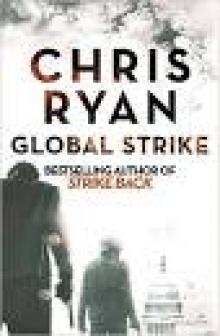 Global Strike
Global Strike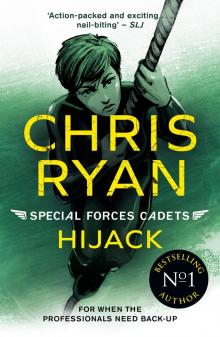 Hijack
Hijack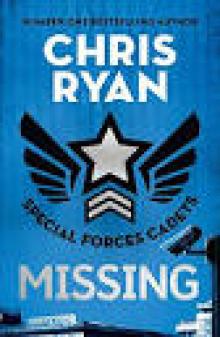 Special Forces Cadets 2
Special Forces Cadets 2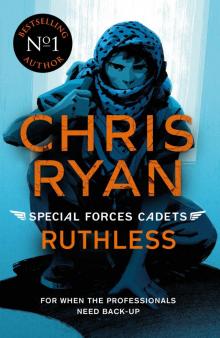 Ruthless
Ruthless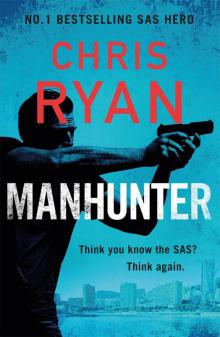 Manhunter
Manhunter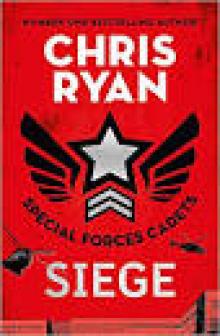 Special Forces Cadets 1
Special Forces Cadets 1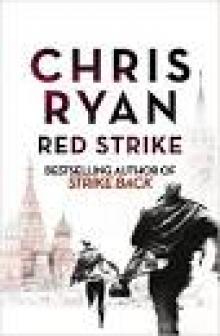 Red Strike
Red Strike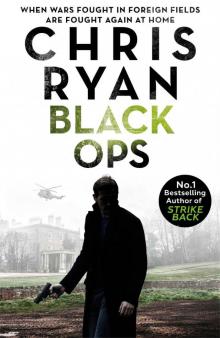 Black Ops
Black Ops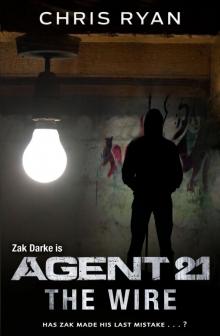 Agent 21: The Wire
Agent 21: The Wire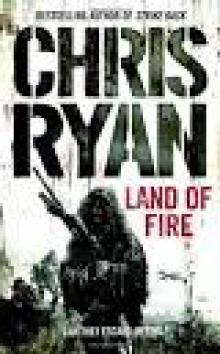 Land of Fire
Land of Fire Alpha Force: Fault Line
Alpha Force: Fault Line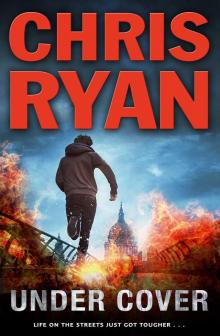 Under Cover (Agent 21)
Under Cover (Agent 21)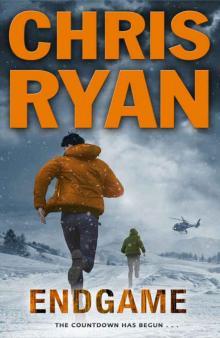 Endgame (Agent 21)
Endgame (Agent 21) Red Centre
Red Centre Blackout
Blackout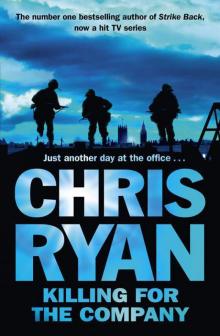 Killing for the Company
Killing for the Company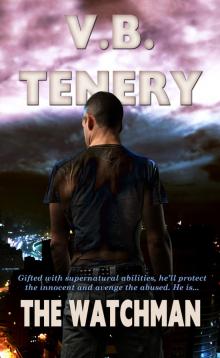 The Watchman
The Watchman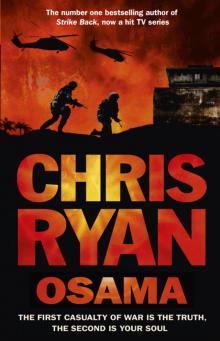 Osama
Osama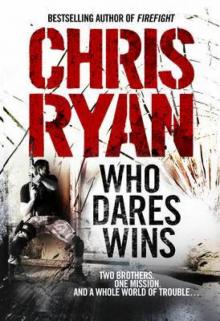 Who Dares Wins
Who Dares Wins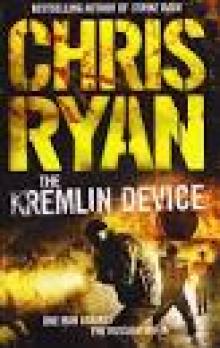 The Kremlin Device
The Kremlin Device Hunter Killer
Hunter Killer Alpha Force: Untouchable
Alpha Force: Untouchable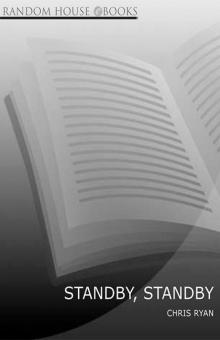 Stand By Stand By
Stand By Stand By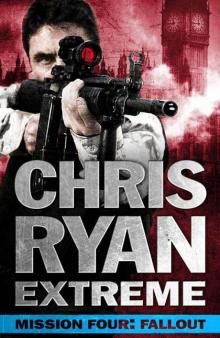 Chris Ryan Extreme: Hard Target: Mission Four: Fallout
Chris Ryan Extreme: Hard Target: Mission Four: Fallout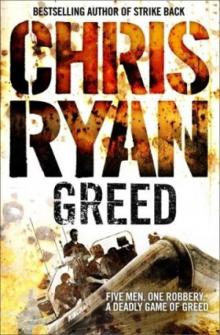 Greed mb-1
Greed mb-1 Alpha Force: Desert Pursuit
Alpha Force: Desert Pursuit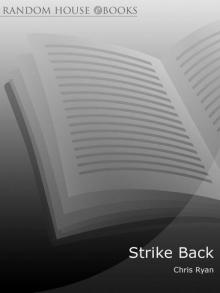 Strike Back
Strike Back Greed
Greed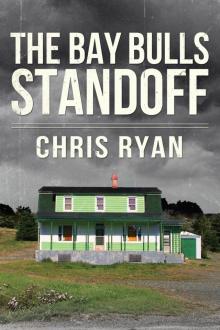 The Bay Bulls Standoff
The Bay Bulls Standoff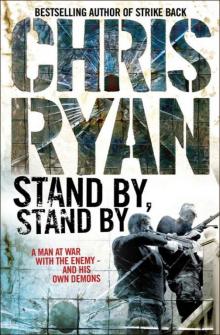 Stand By, Stand By gs-1
Stand By, Stand By gs-1 Outbreak
Outbreak Hunted
Hunted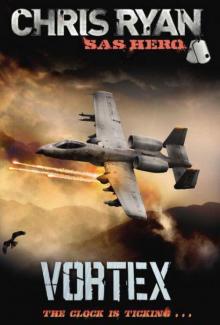 Vortex cr-4
Vortex cr-4 Rat-Catcher
Rat-Catcher Vortex
Vortex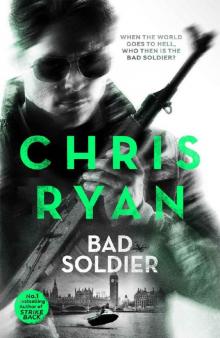 Bad Soldier
Bad Soldier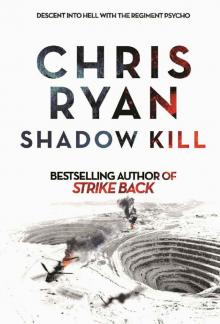 Shadow Kill: A Strikeback Novel
Shadow Kill: A Strikeback Novel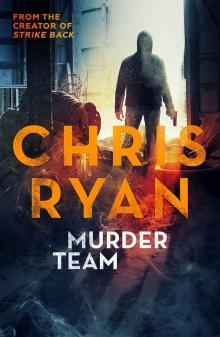 Murder Team (Kindle Single)
Murder Team (Kindle Single) One Good Turn
One Good Turn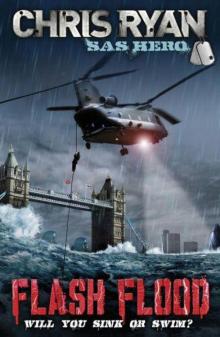 Flash Flood cr-1
Flash Flood cr-1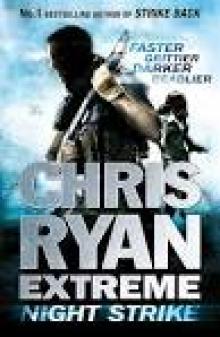 Night Strike
Night Strike Wildfire
Wildfire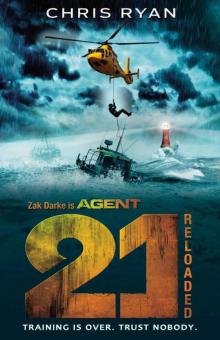 Agent 21: Reloaded: Book 2
Agent 21: Reloaded: Book 2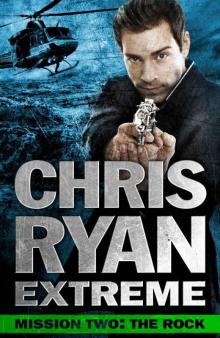 Chris Ryan Extreme: Hard Target: Mission Two: The Rock
Chris Ryan Extreme: Hard Target: Mission Two: The Rock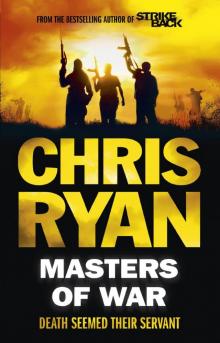 Masters of War
Masters of War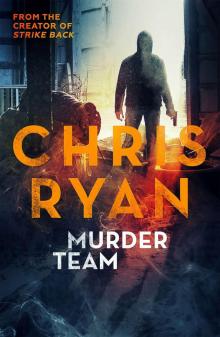 Murder Team
Murder Team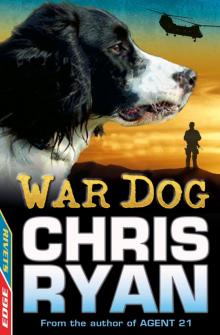 War Dog
War Dog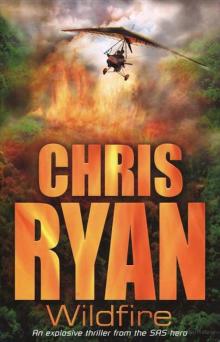 Wildfire cr-2
Wildfire cr-2 Survival
Survival The One That Got Away - Junior edition
The One That Got Away - Junior edition The Hit List
The Hit List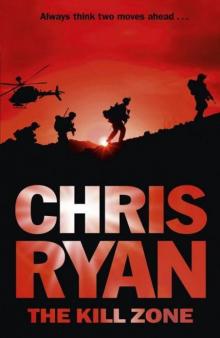 The Kill Zone
The Kill Zone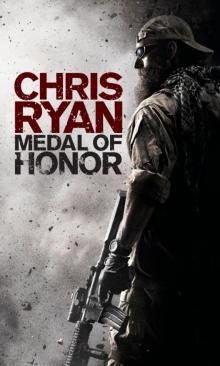 Medal of Honor
Medal of Honor Battleground
Battleground Twister
Twister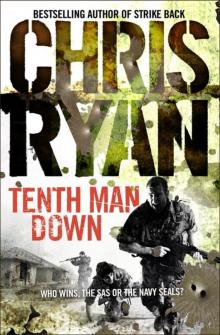 Tenth Man Down gs-4
Tenth Man Down gs-4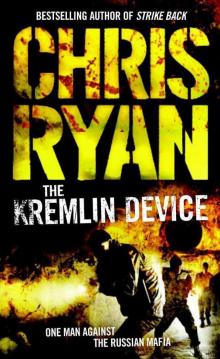 The Kremlin Device gs-3
The Kremlin Device gs-3 Hostage
Hostage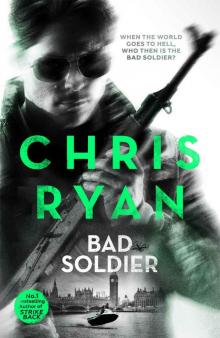 Bad Soldier: Danny Black Thriller 4
Bad Soldier: Danny Black Thriller 4 Alpha Force: Blood Money
Alpha Force: Blood Money Firefight
Firefight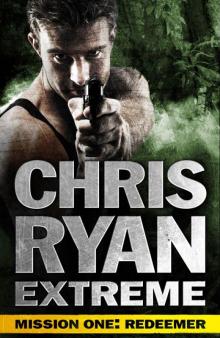 Chris Ryan Extreme: Hard Target: Mission One: Redeemer
Chris Ryan Extreme: Hard Target: Mission One: Redeemer Hit List
Hit List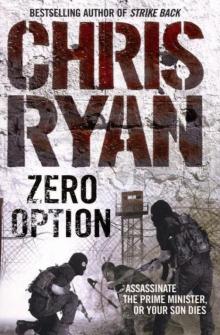 Zero Option gs-2
Zero Option gs-2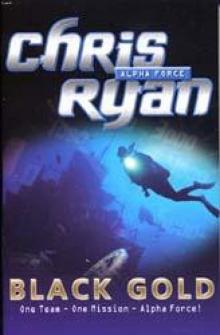 Black Gold
Black Gold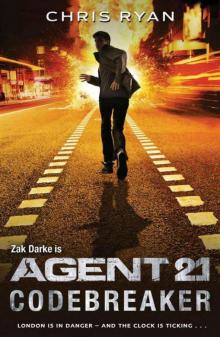 Agent 21: Codebreaker: Book 3
Agent 21: Codebreaker: Book 3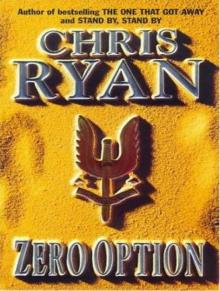 Zero Option
Zero Option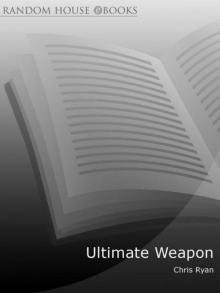 Ultimate Weapon
Ultimate Weapon Tenth Man Down
Tenth Man Down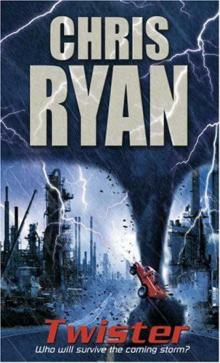 Twister cr-5
Twister cr-5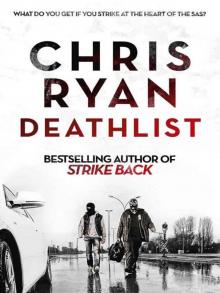 Deathlist
Deathlist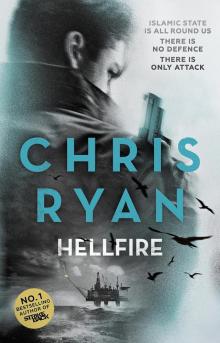 Hellfire
Hellfire Flash Flood
Flash Flood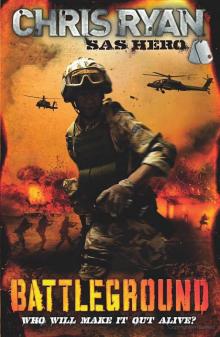 Battleground cr-6
Battleground cr-6 The Increment
The Increment